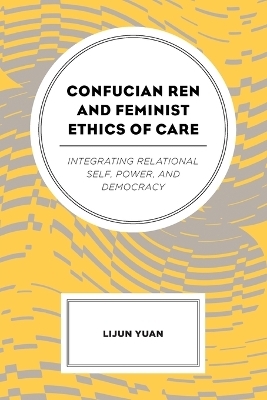
Confucian Ren and Feminist Ethics of Care
Integrating Relational Self, Power, and Democracy
Seiten
2023
Lexington Books (Verlag)
978-1-4985-5820-4 (ISBN)
Lexington Books (Verlag)
978-1-4985-5820-4 (ISBN)
Confucian traditions have ingrained gender stratifications in Chinese culture today. Yuan proposes re-reading early Confucian texts as a vision of Ren with Dao with the unity of heaven, earth, and humanity, in order to reclaim the egalitarian aspects and develop openness for gender equity with integration of feminist critical care ethics.
The rehabilitation of Confucian tradition raised new challenges to Chinese feminist thinkers. Can a Confucian ideal of reciprocity help women realize their equality? What is the hope for Chinese women seeking a social ideal of equality given the growing gender gap in the current economic development of China? Yuan argues Confucianism cannot help unless it is integrated with feminism. In this book, Yuan explores why gendered stratifications perpetuated so deeply in today’s China through the influences of Confucian cultural tradition, but reading early Confucian texts as a cosmological vision of Ren with Dao and ontological oneness as a whole that is the unity of heaven, earth, and humanism, we might reclaim Confucian egalitarian aspects to develop its openness for gender equity with integration of feminist critical care ethics. Throughout the book, Yuan provides multiple perspectives of comparison: relational self vs. power differentials, gender roles differences vs. political demand for equality, and individual reciprocity vs. connection based reciprocity, etc. to embrace inclusive methodology and caring democracy. We see a great hope to break through stereotypes of binary thinking of Minben (people oriented) and Minzhu (autonomous democracy), gender division of labor, reason and emotion, etc. Yuan argues we should integrate feminist critical thoughts of global justice/care with early Confucianism, since both traditions emphasize caring relationships in humanity and interdependency between social individuals within and beyond their communities in a global scale. Importantly, the integration enlarges our philosophical visions of how cultural traditions can be undeniable sources for strengthening contemporary social ideas of humanity, democracy, equality, and freedom for all.
The rehabilitation of Confucian tradition raised new challenges to Chinese feminist thinkers. Can a Confucian ideal of reciprocity help women realize their equality? What is the hope for Chinese women seeking a social ideal of equality given the growing gender gap in the current economic development of China? Yuan argues Confucianism cannot help unless it is integrated with feminism. In this book, Yuan explores why gendered stratifications perpetuated so deeply in today’s China through the influences of Confucian cultural tradition, but reading early Confucian texts as a cosmological vision of Ren with Dao and ontological oneness as a whole that is the unity of heaven, earth, and humanism, we might reclaim Confucian egalitarian aspects to develop its openness for gender equity with integration of feminist critical care ethics. Throughout the book, Yuan provides multiple perspectives of comparison: relational self vs. power differentials, gender roles differences vs. political demand for equality, and individual reciprocity vs. connection based reciprocity, etc. to embrace inclusive methodology and caring democracy. We see a great hope to break through stereotypes of binary thinking of Minben (people oriented) and Minzhu (autonomous democracy), gender division of labor, reason and emotion, etc. Yuan argues we should integrate feminist critical thoughts of global justice/care with early Confucianism, since both traditions emphasize caring relationships in humanity and interdependency between social individuals within and beyond their communities in a global scale. Importantly, the integration enlarges our philosophical visions of how cultural traditions can be undeniable sources for strengthening contemporary social ideas of humanity, democracy, equality, and freedom for all.
Lijun Yuan is professor of philosophy at Texas State University.
Part I
Chapter 1 Strength and Weakness of Early Confucian Ethics on Women
Chapter 2 A Debate about Minben and Minzhu: Toward Caring Democracy
Part II
Chapter 3 Feminist Critiques of Gender Inequality and Ethics of Care
Chapter 4 Notions of Reciprocity: Kongzi, Kant, Beauvoir, and Critiques of Gender Roles
Chapter 5 Methodology of the Ethics of Care: Integrating Care and Justice
Part III
Chapter 6 Hume’s Sympathy, Mengzi’s Empathy, Feminist Interpretations: Extensive Virtue
Chapter 7 China’s Population Policy: Aging, Gender, and Sustainability
| Erscheinungsdatum | 08.04.2023 |
|---|---|
| Verlagsort | Lanham, MD |
| Sprache | englisch |
| Maße | 151 x 229 mm |
| Gewicht | 272 g |
| Themenwelt | Geisteswissenschaften ► Philosophie ► Geschichte der Philosophie |
| Geisteswissenschaften ► Philosophie ► Östliche Philosophie | |
| Geisteswissenschaften ► Religion / Theologie | |
| ISBN-10 | 1-4985-5820-8 / 1498558208 |
| ISBN-13 | 978-1-4985-5820-4 / 9781498558204 |
| Zustand | Neuware |
| Haben Sie eine Frage zum Produkt? |
Mehr entdecken
aus dem Bereich
aus dem Bereich
die kolonialen Wurzeln der französischen Theorie
Buch | Hardcover (2024)
Matthes & Seitz Berlin (Verlag)
28,00 €
oder Das Leben Montaignes in einer Frage und zwanzig Antworten
Buch | Softcover (2023)
C.H.Beck (Verlag)
18,00 €


